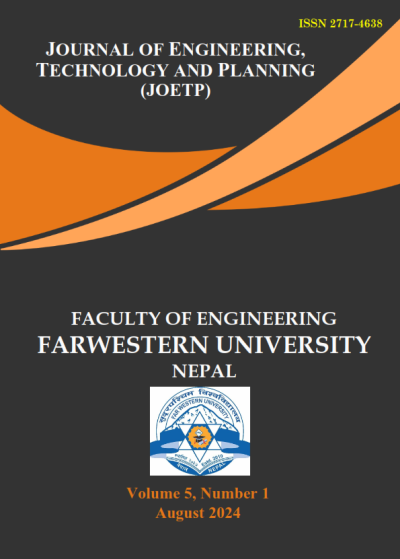Evaluation of Flexible Pavement Friction Coefficients: A Case Study of East-West Highway Near Mahendranagar City, Nepal
DOI:
https://doi.org/10.3126/joetp.v5i1.69694Keywords:
AADT, Friction, IRI,, Skid Resistance Test, Surface dressingAbstract
Friction is a crucial factor in highway engineering, as it affects the traction between a vehicle's wheels and the road surface. This traction significantly influences the movement, speed, and efficiency of vehicles on highways. The coefficient of friction depends on various factors, such as pavement materials, traffic volume, road age, temperature, and weather conditions. The Skid Resistance Test Method is adopted for the study, which involves using a Portable Skid Resistance Tester to measure the British Pendulum Number (BPN) and then calculating the coefficient of friction by dividing the BPN by 10. An evaluation of a 5 km stretch of the East-West highway near Mahendranagar Bazaar revealed a longitudinal coefficient of friction of 0.354 and a lateral coefficient of friction of 0.184 under both dry and wet conditions. These findings were relevant for design speeds ranging from 60 to 80 km/h and considered an Annual Average Daily Traffic (AADT) of 10,321 Passenger Car Units (PCU) during the year 2023/2024. The assessment also indicated a variance of 0.19% and a poor International Roughness Index (IRI) value of 2.05. These aggregates had specific gravities ranging from 2.6 to 2.67 and were sized at 13.2 mm. The application rate for the aggregates ranged from 12 to 15 kg per square meter. It is important to note that a higher coefficient of friction leads to reduced vehicle efficiency. Thus, it is crucial to carefully consider the coefficient of friction values and detailed specifications to ensure traffic safety and road integrity.
Downloads
Downloads
Published
How to Cite
Issue
Section
License
Copyright © Faculty of Engineering, Far Western University

